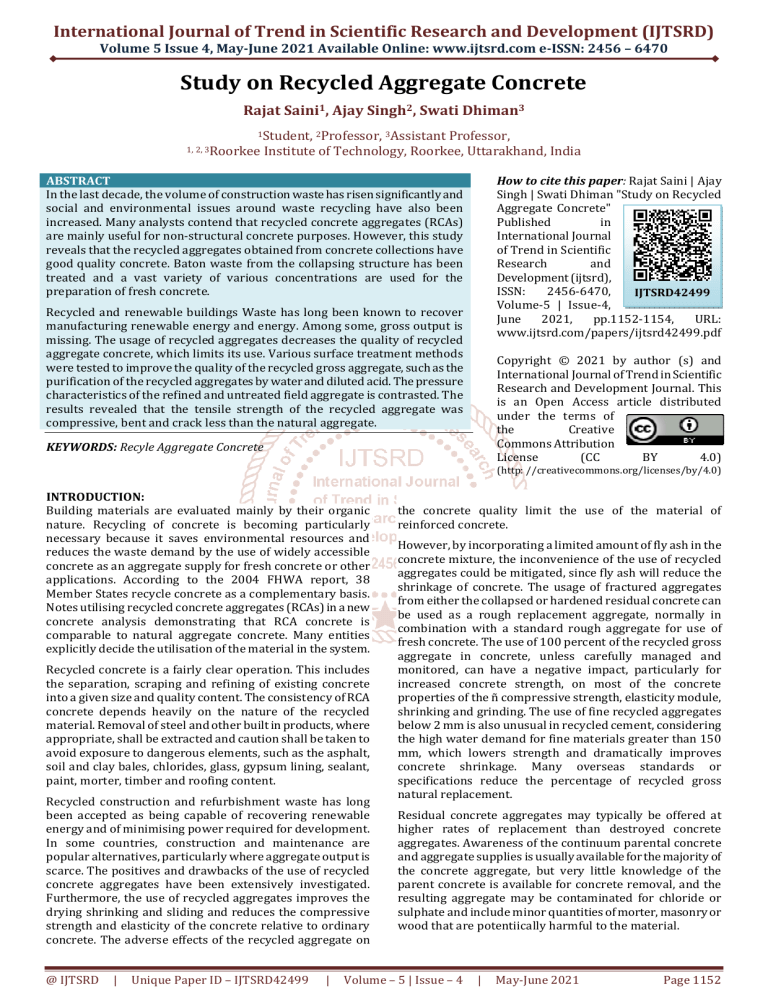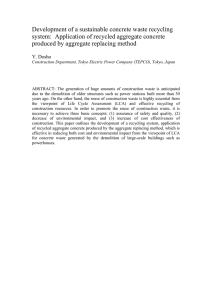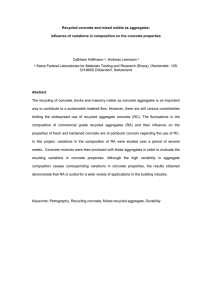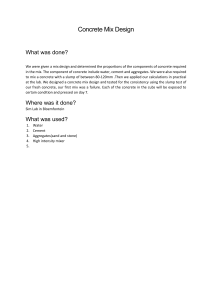
International Journal of Trend in Scientific Research and Development (IJTSRD) Volume 5 Issue 4, May-June 2021 Available Online: www.ijtsrd.com e-ISSN: 2456 – 6470 Study on Recycled Aggregate Concrete Rajat Saini1, Ajay Singh2, Swati Dhiman3 1Student, 2Professor, 3Assistant 1, 2, 3Roorkee Professor, Institute of Technology, Roorkee, Uttarakhand, India How to cite this paper: Rajat Saini | Ajay Singh | Swati Dhiman "Study on Recycled Aggregate Concrete" Published in International Journal of Trend in Scientific Research and Development (ijtsrd), ISSN: 2456-6470, IJTSRD42499 Volume-5 | Issue-4, June 2021, pp.1152-1154, URL: www.ijtsrd.com/papers/ijtsrd42499.pdf ABSTRACT In the last decade, the volume of construction waste has risen significantly and social and environmental issues around waste recycling have also been increased. Many analysts contend that recycled concrete aggregates (RCAs) are mainly useful for non-structural concrete purposes. However, this study reveals that the recycled aggregates obtained from concrete collections have good quality concrete. Baton waste from the collapsing structure has been treated and a vast variety of various concentrations are used for the preparation of fresh concrete. Recycled and renewable buildings Waste has long been known to recover manufacturing renewable energy and energy. Among some, gross output is missing. The usage of recycled aggregates decreases the quality of recycled aggregate concrete, which limits its use. Various surface treatment methods were tested to improve the quality of the recycled gross aggregate, such as the purification of the recycled aggregates by water and diluted acid. The pressure characteristics of the refined and untreated field aggregate is contrasted. The results revealed that the tensile strength of the recycled aggregate was compressive, bent and crack less than the natural aggregate. Copyright © 2021 by author (s) and International Journal of Trend in Scientific Research and Development Journal. This is an Open Access article distributed under the terms of the Creative Commons Attribution License (CC BY 4.0) KEYWORDS: Recyle Aggregate Concrete (http: //creativecommons.org/licenses/by/4.0) INTRODUCTION: Building materials are evaluated mainly by their organic nature. Recycling of concrete is becoming particularly necessary because it saves environmental resources and reduces the waste demand by the use of widely accessible concrete as an aggregate supply for fresh concrete or other applications. According to the 2004 FHWA report, 38 Member States recycle concrete as a complementary basis. Notes utilising recycled concrete aggregates (RCAs) in a new concrete analysis demonstrating that RCA concrete is comparable to natural aggregate concrete. Many entities explicitly decide the utilisation of the material in the system. Recycled concrete is a fairly clear operation. This includes the separation, scraping and refining of existing concrete into a given size and quality content. The consistency of RCA concrete depends heavily on the nature of the recycled material. Removal of steel and other built in products, where appropriate, shall be extracted and caution shall be taken to avoid exposure to dangerous elements, such as the asphalt, soil and clay bales, chlorides, glass, gypsum lining, sealant, paint, morter, timber and roofing content. Recycled construction and refurbishment waste has long been accepted as being capable of recovering renewable energy and of minimising power required for development. In some countries, construction and maintenance are popular alternatives, particularly where aggregate output is scarce. The positives and drawbacks of the use of recycled concrete aggregates have been extensively investigated. Furthermore, the use of recycled aggregates improves the drying shrinking and sliding and reduces the compressive strength and elasticity of the concrete relative to ordinary concrete. The adverse effects of the recycled aggregate on @ IJTSRD | Unique Paper ID – IJTSRD42499 | the concrete quality limit the use of the material of reinforced concrete. However, by incorporating a limited amount of fly ash in the concrete mixture, the inconvenience of the use of recycled aggregates could be mitigated, since fly ash will reduce the shrinkage of concrete. The usage of fractured aggregates from either the collapsed or hardened residual concrete can be used as a rough replacement aggregate, normally in combination with a standard rough aggregate for use of fresh concrete. The use of 100 percent of the recycled gross aggregate in concrete, unless carefully managed and monitored, can have a negative impact, particularly for increased concrete strength, on most of the concrete properties of the ñ compressive strength, elasticity module, shrinking and grinding. The use of fine recycled aggregates below 2 mm is also unusual in recycled cement, considering the high water demand for fine materials greater than 150 mm, which lowers strength and dramatically improves concrete shrinkage. Many overseas standards or specifications reduce the percentage of recycled gross natural replacement. Residual concrete aggregates may typically be offered at higher rates of replacement than destroyed concrete aggregates. Awareness of the continuum parental concrete and aggregate supplies is usually available for the majority of the concrete aggregate, but very little knowledge of the parent concrete is available for concrete removal, and the resulting aggregate may be contaminated for chloride or sulphate and include minor quantities of morter, masonry or wood that are potentiically harmful to the material. Volume – 5 | Issue – 4 | May-June 2021 Page 1152 International Journal of Trend in Scientific Research and Development (IJTSRD) @ www.ijtsrd.com eISSN: 2456-6470 Recycled aggregate concrete may therefore be produced by recycling a 100% gross aggregate replacement aggregate, with close monitoring of parent cement, recycled aggregate manufacturing and production of recycled aggregate concrete. CLASSIFICATION OF AGGREGATES For the purpose of this thesis, the following classifications are adopted. 1. NATURAL AGGREGATE Aggregates may be derived from natural or processed materials. Natural aggregates originate from rock, three broad geological classifications of which exist. Igneous rock, these rocks are often crystal clear and contain a molten rock beneath the surface of the earth (magma). This sedimentary rocks are composed of insoluble dissolved content ( e.g., the remnants of natural rock accumulated at the bottom of the ocean or lake). This material is turned by heat and pressure into a rock. Sedimentary rocks are structured in texture and are sometimes categorised as calcareous (calcious), siliceous (sandstone, etc.) or argillaceous depending on their prevailing minerals (shale, etc.). Metamorphic rock, these are neglected rocks or sedimentary rocks subjected to sufficiently heat and/or pressure to change their mineral composition to differentiate them from the original rock. Aggregates are generated in a quarry or mine whose fundamental aim is to convert rock in situ into aggregates with specified characteristics. The rock is usually fired or removed from the walls of a quarry and then reduced in size by a mixture of screens and crushers. There are also some quarries used to wash the finished aggregate. 2. RECYCLED AGGREGATES Construction materials are assessed mainly by their environmental efficiency. Burst recycling becomes particularly significant because it saves natural energy and eliminates the need for landfills by the use of readily available building as an aggregate supply for fresh concrete or other applications. In a recent concrete study, states utilising recycled concrete aggregates (RCA) perform RCA concrete with natural aggregates. Many entities explicitly describe the use of the material in the revived scheme. Recycled concrete is very simple to work. It includes the division, scraping and moulting into a material of a certain size and quality. Case Study: O’Hare Modernization Project @ IJTSRD | Unique Paper ID – IJTSRD42499 | For use in the O'Hare modernization scheme, recycled concrete aggregates are considered (OMP). The laboratory experiments utilising a two-stage mixing system have shown the RCA from Chicago O'Hare International Airport to minimise bleeding and separation and to produce comparable working properties as virgin aggregates, compressive strength and shrinkage. A field test for RCA was launched in October 2009 on two pathways at Gate F7B. In addition, a concrete lane utilising virgin aggregates was placed close the concrete lane using RCA. The RCA was assembled on site using an airportremoved aggregate. The RCA was handled as lightweight aggregates by the ready mixed concrete supplier and was able to manufacture concrete in one-stop blending phase. The work abilities were close to those of the virgin aggregate concrete, and the placement was well finished. The placement was in full operation within four days. At the time of placement, sensors were mounted within the concrete to measure the relative internal humidity, temperature and slab rise from the cement-treated permeable foundation. Other properties such as surface appearance and joint width were tracked periodically. The results for the two concrete lanes was statistically the same after five months of testing, indicating no behavioural variations between the concrete of the RCA and virgin aggregate concrete. SCOPE AND METHOD OF RESEARCH In the following studies the quality improvement of recycled fine aggregates and the properties of concrete utilising recycled aggregates have been studied. (1) An study of the recycled fine aggregates quality assurance The fine aggregate of recycled materials contains high amounts of incoherent organic and inorganic impurity that poses concerns about the reduction in concrete consistency. The manufacturing facilities for the enhancement of performance of recycled fine aggregates were checked, machinery used for the extraction of impurities and strips of recycled finishes was set up to enhance the efficiency and durability of the recycled fine aggregate. (2) Mixed aggregate quality control study The recycled and natural aggregates are gravitational separately and integrate independently in the concrete production. This results in qualitative variations in the concrete if the mixer efficiency is low. Aggregate mixers were often built to ensure that processed and normal aggregates are safely mixed. Densities, absorption rates and other mixed aggregate properties have been checked for various formulations. In addition, following the pre-premix, the coherence variance characteristics of recycled aggregate concrete were calculated and a prepremixing method for the aggregate was developed. (3) Scientific analysis of dynamics and longevity between concrete by utilising recycled aggregates Prior and subsequent modifications together is tested the content of the substitute physical and mechanical properties of the concrete contained in a recycled fine aggregate. Cement was mixed with the recycled aggregate and had an average power of 24 MPa or 35 MPa (high force). The physical, mechanical and solid characteristics of cement, composed of the recycled fine aggregates, were studied before and after adjustment to calculate the slump, air thickness, compressive power, shrinkage, freezing and tail strength and all remaining properties. Volume – 5 | Issue – 4 | May-June 2021 Page 1153 International Journal of Trend in Scientific Research and Development (IJTSRD) @ www.ijtsrd.com eISSN: 2456-6470 CONCLUSION The UK building business requires 295 million tonnes of new material per annum, displaces 22 million tonnes of manufacturing by-product per year, and annually generates around 150 million tonnes of construction waste and demolition. Of this, 46 million tonnes are recovered for manufacturing, construction or land reconstructions, thus decreasing the quantity of material stored and reducing the demand for raw materials in new houses. A new concrete structure is more likely to hit the end of its usable lives, so it cannot be used anymore than because the concrete has deteriorated due to age. The versatility and adaptability of the concrete ensures that apparently obsolete buildings may also be cut to their centre and then re-constructed to new modern requirements. If a building has to be destroyed, so a potentially rich supply of recycled aggregates (RA) is given for a variety of uses. Recycled concrete is a suitable aggregate supply which has been used in granular substrates, soil cement, and the fresh concrete satisfactorily. Recycled aggregates are in one of two forms defined as: Aggregate recycled (RA), or as Bit recycled aggregate (RCA). There is now no proof with the increasing attention to recycle construction waste that hard demolition and building waste is sent to site waste (ii). The recycled and secondary aggregates make up 28% of the overall market: the largest of all European countries. Recycled concrete aggregates are a particular subset of recycled aggregates (RCAs), where the material is reduced to no more than five percent. The efficiency characteristics of RCA are greater than RA, so the usage of RCA in concrete is less limited. BS 8500-2 allows for the application of RCA in concrete. Roughly 75-80% of the secondary and reclaimed aggregates are expected to be sub-base and fill, like road repair and airfield paves. However, owing to the concrete's intrinsic inert value, the concrete industry actively utilises industrial ecology in the manufacture of new concrete goods. The concrete parts can be recycled and concrete can also be recycled; both products are typically available locally. Better portions of demolited buildings, such as gabion walls or rip rap, may also be reused to defend shorelines. At the end of their lives, several formwork choices are reusable. Around half of the concrete manufactured in Great Britain is hardened and, unlike structural steel, the reinforcement stain created in Great Britain is made exclusively of recycled steel, which can be re-used at the end of the construction or of the building life itself. While steel manufacturing is an incredibly energy-intensive company, the energy required to produce one tonne of reinforced steel is only one half of the energy needed to produce one tonne of structural steel from iron ore. Most cement plants consume leftover fuels, such as used solvents, used oils and pneumatics. The UK generates 400 000 tonnes of waste pneumatic tyres per year, creating a huge environmental issue. Legislation forbids the drainage of pipes into deposits and at present about 40% of waste pipes are recycle into retracts, all-weather surfaces and other applications, but there are still 28 million pipes which are seemingly unused. @ IJTSRD | Unique Paper ID – IJTSRD42499 | Usable tyres, without any harmful environmental impact, are suitable for processing cement kiln material. The kiln temperatures are so high that pipe burns without smoke or fires, and the residue from burning tyres may even be recycled chemically and reused again as heat. Fossil fuel and greenhouse dioxide are the clear payoff from burning tyres. The UK cement sector is currently expected to use 5.6 million waste tyres. Other alternate cement fuels such as recycled liquid gasoline, inert refined sewage pellets (PSPs) and manufacturing waste are also being evaluated. Used tyres, as they involve steel fibre were also recycled to concrete, according to recent research funded by the Ministry of Commerce and Industry (DTI). Recycled steel fibre (cheaper than traditional stainless steel fibre) was found to improve the strength, ductility and resilience of the concrete, rendering it ideal for a variety of specialised applications such as impacts and acoustic barriers. REFERENCES [1] M. ChakradharaRao “Recycled coarse aggregate and its use in concrete”, ICI journal January-march 2011, pp. 27- 40. [2] Bureau of Indian standards (1970) Indian standard specification for coarse (IS:2863) and fine aggregate (IS:383) from natural sources. [3] Bureau of Indian standards IS:10262(1982 & 2009) Indian standard recommended guide line for concrete mix. [4] M.S.SHETTY, Book on concrete technology. [5] RILEM (1994) Specifications for concrete with recycled aggregates, materials and structures, 27, pp. 557- 559. [6] Hansen, T.C., 1999. Recycled aggregates and recycled aggregate concrete second state-of-the-art report developments 1945ñ1985. Mater. Struct. 19: 201246. DOI: 10.1007/BF02472036 [7] Hoe, K.W. and M. Ramli, 2010. Rational mix design approach for high strength concrete using sand with very high fineness modulus. Am. J. Eng. Applied Sci., 7: 1562-1568. DOI: DOI: 10.3844/ajassp.2010.1562.1568 [8] Kumar, D.R. and B. Vidivelli, 2010. Acrylic rubber latex in ferrocement for strengthening reinforced concrete beams. Am. J. Eng. Applied Sci., 3: 277- 285. DOI: 10.3844/ajeassp.2010.277.285 [9] Kumaran, G.S., N. Mushule and M. Lakshmipathy, 2008. A review on construction technologies that enables environmental protection: rubberized concrete. Am. J. Eng. Applied Sci., 1: 40-44. DOI: 10.3844/ajeassp.2008.40.44 [10] Maghsoudi, A.A. and Y. Sharifi, 2008. The serviceability considerations of HSC heavily steel reinforced members under bending. Am. J. Applied Sci., 5: 1135-1140. DOI: 10.3844/ajassp.2008.1135.1140 [11] Mehta, P.K. and P.J.M. Monteiro, 2006. Concrete. Microstructure, Properties and Materials. 3rd Edn, the McGraw Hill, New York, ISBN: 10:0071462899, pp: 659. [12] BalaguruP1, Stephen Kurtz 2, and Jon Rudolph 3. ìGeopolymer for Repair and Rehabilitation of Reinforced Concrete Beamsî. Geopolymer Institute 1997 02100 SAINT-QUENTIN ñ France. of Materials in Civil Engineering, 25(12), 1795–1802. Volume – 5 | Issue – 4 | May-June 2021 Page 1154



